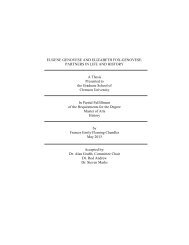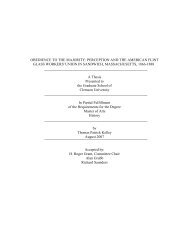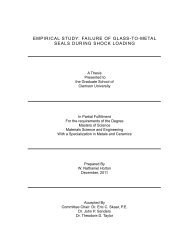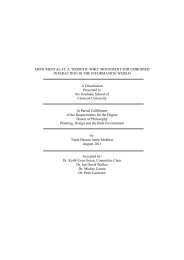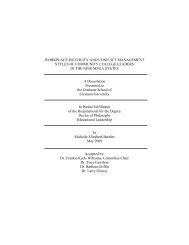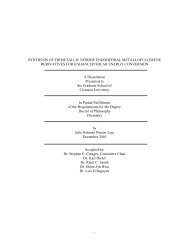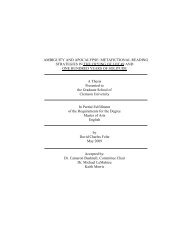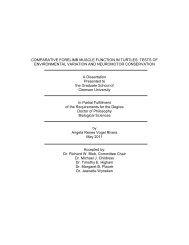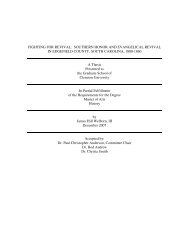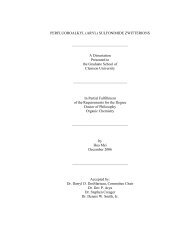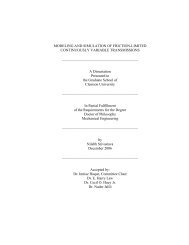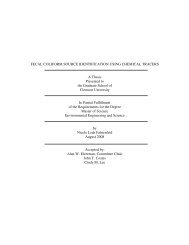- Page 1 and 2: CHARLESTON CONTRADICTIONS: A CASE S
- Page 3 and 4: Board of Architectural Review, atto
- Page 5 and 6: ACKNOWLEDGMENTS I would like to tha
- Page 7 and 8: Table of Contents (Continued) Page
- Page 9 and 10: List of Figures (Continued) Figure
- Page 11 and 12: CHAPTER ONE INTRODUCTION PROBLEM ST
- Page 13 and 14: would not be opposed to their demol
- Page 15 and 16: Modernists. It was one of the build
- Page 17: RESEARCH QUESTIONS This research pr
- Page 21 and 22: of social science and feels that, s
- Page 23 and 24: pitfalls of both relativism and pos
- Page 25 and 26: ehind cultural expression. This is
- Page 27 and 28: approach to social research that Fa
- Page 29 and 30: development. Since the rich and var
- Page 31 and 32: open to the public set the preceden
- Page 33 and 34: Ironically, as Rockefeller was reco
- Page 35 and 36: including owning and administering
- Page 37 and 38: home to several educational program
- Page 39 and 40: learned at European schools of arch
- Page 41 and 42: includes building from the 1950s an
- Page 43 and 44: for adoption of the elements of Cor
- Page 45 and 46: New additions, exterior alterations
- Page 47 and 48: uilding from the past if there is n
- Page 49 and 50: CHARLESTON PRESERVATION BACKGROUND
- Page 51 and 52: property on the inventory be review
- Page 53 and 54: The fact that none of Charleston’
- Page 55 and 56: past for the benefit of the present
- Page 57 and 58: for Historic Preservation conferenc
- Page 59 and 60: labeled as significant under Criter
- Page 61 and 62: PRESERVATION OF THE RECENT PAST LIT
- Page 63 and 64: Alan Hess is an architect and advoc
- Page 65 and 66: the depth and resonance of ‘true
- Page 67 and 68: time allows us to properly evaluate
- Page 69 and 70:
techniques need to be modified when
- Page 71 and 72:
een replaced by another one. He lik
- Page 73 and 74:
uilding that needs to be preserved.
- Page 75 and 76:
Journalist Kim O’Connell writes t
- Page 77 and 78:
and the project is set to proceed,
- Page 79 and 80:
cues can reflect a deeper meaning t
- Page 81 and 82:
According to Day, a new addition ca
- Page 83 and 84:
disciplines of the built environmen
- Page 85 and 86:
“time” and he is critical of so
- Page 87 and 88:
warned that there is not a single s
- Page 89 and 90:
Semes, he feels that it is the buil
- Page 91 and 92:
decorative detail or call for it; t
- Page 93 and 94:
Bauhaus]” (Signorelli and Salinga
- Page 95 and 96:
een prevented. He is also critical
- Page 97 and 98:
The Modernists generally support th
- Page 99 and 100:
CHAPTER THREE RESEARCH METHODS RESE
- Page 101 and 102:
design, was used for this case stud
- Page 103 and 104:
the Historic Charleston Foundation.
- Page 105 and 106:
including drawings, maps, and photo
- Page 107 and 108:
and experience in Charleston’s pr
- Page 109 and 110:
explanatory studies, the explanatio
- Page 111 and 112:
validity of the study and that ther
- Page 113 and 114:
since all three buildings and prese
- Page 115 and 116:
OLD CHARLESTON COUNTY LIBRARY, 404
- Page 117 and 118:
Figure 4: 1888 Sanborn map, showing
- Page 119 and 120:
Figure 7: 1934 aerial photo of Char
- Page 121 and 122:
necessary daylight for the facility
- Page 123 and 124:
the BAR, even if they were not loca
- Page 125 and 126:
Other editorials against the propos
- Page 127 and 128:
Other writers wondered how long it
- Page 129 and 130:
mixing of races, stating: “Indeed
- Page 131 and 132:
Articles discussing the future of M
- Page 133:
Figure 13: Rendering of new hotel f
- Page 136 and 137:
On February 20 th , 2008 the Board
- Page 138 and 139:
Figure 17: An undated historic phot
- Page 140 and 141:
Figure 19: 1888 Sanborn map showing
- Page 142 and 143:
On November 8 th , 1948, the federa
- Page 144 and 145:
can demonstrate the requirements of
- Page 146 and 147:
As compared to the controversy that
- Page 148 and 149:
The building was full of asbestos,
- Page 150 and 151:
demolish the existing Federal Build
- Page 152 and 153:
Later that year, Michael Maher of t
- Page 154 and 155:
proposed to place a covenant on the
- Page 156 and 157:
Figure 29: Additional rendering of
- Page 158 and 159:
the statement, are that it was the
- Page 160 and 161:
limited to business hours, and a pr
- Page 162 and 163:
Figure 31: Rendering of the propose
- Page 164 and 165:
Figure 32: Proposed 1958 Charleston
- Page 166 and 167:
conventions and money to the city.
- Page 168 and 169:
Despite the fact that the project w
- Page 170 and 171:
Part of the winning plan called for
- Page 172 and 173:
Figure 37: 1960s aerial photo of th
- Page 174 and 175:
Figure 39: Mid-1960’s aerial phot
- Page 176 and 177:
David Schwarz would be the architec
- Page 178 and 179:
Critics agreed that the building ne
- Page 180 and 181:
Figure 41: Rendering of the propose
- Page 182 and 183:
On June 13 th , 2012, the Gaillard
- Page 184 and 185:
of performances at the building has
- Page 186 and 187:
down building with a simple pedimen
- Page 188 and 189:
thought was that building something
- Page 190 and 191:
thought to be as important as build
- Page 192 and 193:
the 1960s, was also cited for raisi
- Page 194 and 195:
uildings with controversial designs
- Page 196 and 197:
eaction that the building elicits t
- Page 198 and 199:
much more of the building was being
- Page 200 and 201:
As opposed to the overall preservat
- Page 202 and 203:
difficult to reuse without major al
- Page 204 and 205:
Thinking more about the style of pr
- Page 206 and 207:
it was not important to save every
- Page 208 and 209:
There have been many buildings on e
- Page 210 and 211:
considered on their own merits, rat
- Page 212 and 213:
For the Gaillard Auditorium, partic
- Page 214 and 215:
preservationists comfortable with t
- Page 216 and 217:
Another participant reiterated that
- Page 218 and 219:
uildings to preserve or not, partic
- Page 220 and 221:
enough to be considered cutting-edg
- Page 222 and 223:
One participant noted that since th
- Page 224 and 225:
Since there is a perceived lack of
- Page 226 and 227:
design in Charleston and everyone,
- Page 228 and 229:
preservation movement going, becaus
- Page 230 and 231:
procedures of historic preservation
- Page 232 and 233:
questioned. However, as is many tim
- Page 234 and 235:
tradition towards a more industrial
- Page 236 and 237:
these resources needed to be recogn
- Page 238 and 239:
proposed to create these alteration
- Page 240 and 241:
that the paint needed to be less op
- Page 242 and 243:
create an “exceptional” end pro
- Page 244 and 245:
designed in the Modern style do not
- Page 246 and 247:
oke with the tradition and appearan
- Page 248 and 249:
already failing, contributing to th
- Page 250 and 251:
that attempt is debatable, dependin
- Page 252 and 253:
not be convinced that it is worth s
- Page 254 and 255:
The treatments that the three build
- Page 256 and 257:
once was there. While the preferenc
- Page 258 and 259:
This phenomenon is demonstrated by
- Page 260 and 261:
starting to reach the cutoff to be
- Page 262 and 263:
sustainability angle, since the gre
- Page 264 and 265:
their usefulness and needed to be u
- Page 266 and 267:
While preservation attempts to have
- Page 268 and 269:
uildings that the movement preserve
- Page 270 and 271:
the past that it recedes. While pre
- Page 272 and 273:
uildings. The example of the BAR in
- Page 274 and 275:
different buildings for the case st
- Page 276 and 277:
future designers and researchers wi
- Page 278 and 279:
CHAPTER NINE REFERENCE LIST A Young
- Page 280 and 281:
———. 2010e. Gaillard Makeover
- Page 282 and 283:
Cusato, Marianne, Ben Pentreath, Ri
- Page 284 and 285:
Goldberger, Paul. 2008. The Moderni
- Page 286 and 287:
Johnson, Nicole. 2012. Developer Mo
- Page 288 and 289:
McClure, Harlan E. and Vernon Hodge
- Page 290 and 291:
Nielsen, J. V., Jr. 1955. Growing N
- Page 292 and 293:
Seidman, I. E. 1991. Interviewing a
- Page 294 and 295:
Tiller, de Teel P. 2007. Obey the I



